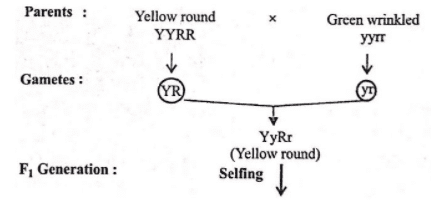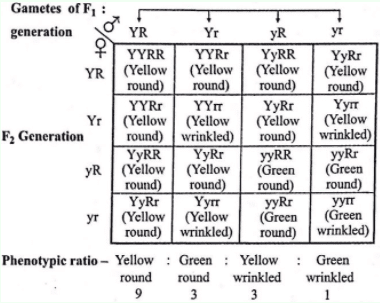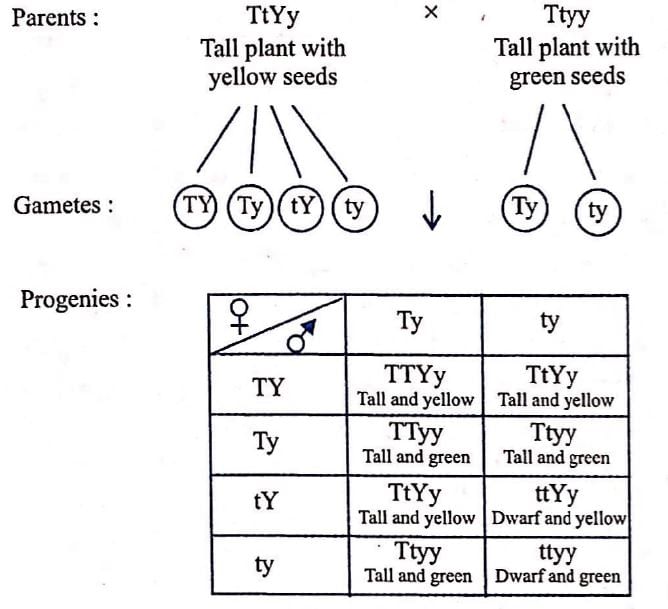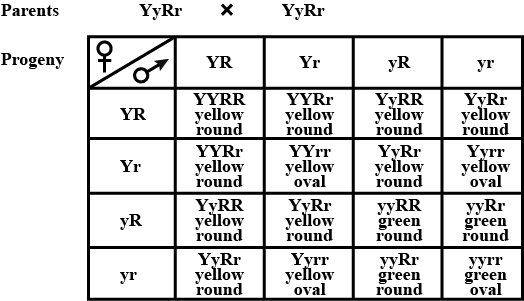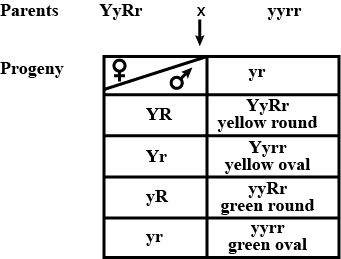Test: Inheritance of Two Genes (NCERT) - NEET MCQ
15 Questions MCQ Test - Test: Inheritance of Two Genes (NCERT)
"When two pairs of traits are combined in a hybrid, segregation of one pair of characters is independent of the other pair of characters is independent of the other pair of characters." The statement is independent of the other pair of characters. The statement explains which of the following laws/principles of Mendel?
Match column -I with column-ii and select the correct option from the codes given below
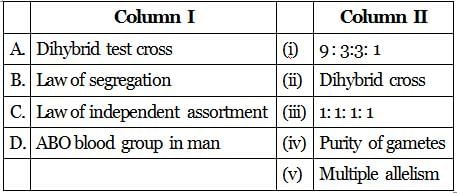

In Mendelian dihybrid cross, when heterozygous Round Yellow are self crossed, Round Green offsprings are represented by the genotype
A man having the genotype EEFfGgHH can produce P number of genetically different sperms, and a woman of genotype liLLMmNn can generate Q number of genetically different eggs. Determine the values P and Q.
When a cross is made between a tall plant with yellow seeds (Tt Yy) and a tall plant with green seeds (Tt yy), what is true regarding the proportions of phenotypes of the offsprings in F1 generation?
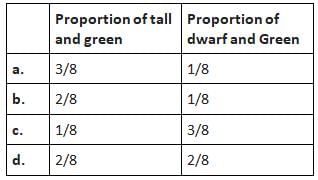
Refer the given statements and select the correct option,
(i) Percentage of homozygous dominant individuals obtained by selfing Aa individuals is 25%.
(ii) Types of genetically different gametes produced by genotype AABbcc are 2.
(iii) Phenotypic ratio of monohybrid F2 progeny in case of Mirabilis jalapa is 3:1.
Law of independent assortment can be explained with the help of
The percentage of ab gamete produced by AaBb parent will be
The given Punnett's square represents the pattern of inheritance in a dihybrid cross where yellow (Y) and round (R) seed condition is dominant over white (y) and wrinkled (r) seed condition.
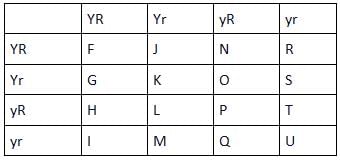
A plant of type 'H' will produce seeds with the genotype identical to seeds produced by the plants of
In maize, coloured endosperm (C) is dominant over colourless (c); and full endosperm (R) is dominant over shrunken (r). When a dihybrid of F1 generation were test crossed, it produced four phenotypes in the following percentage:
Coloured full 48%, Coloured shrunken 5%,
Colourless full 7%, and Colourless shrunken 40%.
From this data, what will be the distance between two non-allelic genes?
What proportion of the offsprings obtained from cross AABBCC x AaBbCc will be completely heterozygous for all the genes segregated independently?
True-breeding red-eyed Drosophila flies with plain thoraxes were crossed with pink-eyed flies with striped thoraxes
Red eye plain thorax × Pink eye striped thorax
The F1 flies were then test crossed against the double recessive.
The following F2 generation resulted from the cross:

What percentage number of recombinants resulted from the test cross ?
Mendel law of independent assortment does not hold true for the genes that are located closely on
Read the given paragraph to answer
In a certain plant, yellow fruit colour (Y) is dominant to green fruit colour (y) and round shape (R) is dominant to oval shape (r). The two genes involved are located on different chromosomes.
Which of the following will result when plant YyRr is self-pollinated?
Read the given paragraph to answer
In a certain plant, yellow fruit colour (Y) is dominant to green fruit colour (y) and round shape (R) is dominant to oval shape (r). The two genes involved are located on different chromosomes.
Which of the following is correct for the condition when plant YyRr is back crossed with the double recessive parent?



